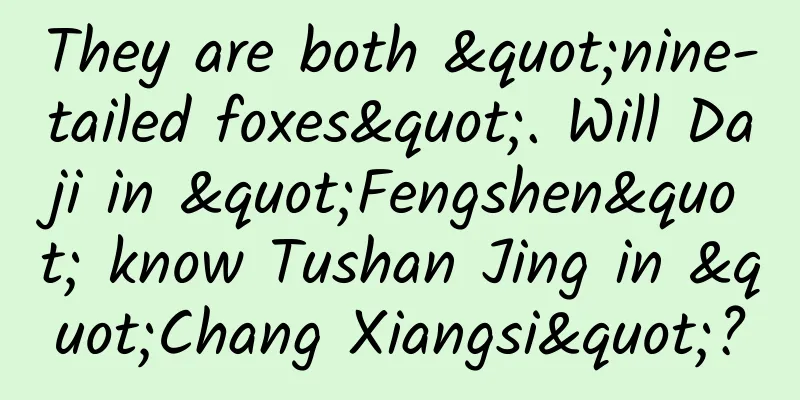They are both "nine-tailed foxes". Will Daji in "Fengshen" know Tushan Jing in "Chang Xiangsi"?

|
Do you feel that the recent TV dramas and movies seem to have "stirred up a nest of nine-tailed foxes" ? From the female fox Daji in the movie "The Gods" to the male fox Tu Shanjing in the TV series "Longing", both are quite popular characters. Going back further, the nine-tailed fox can really be regarded as an "old actor" in the fairy tale drama. In the "Three Lives Three Worlds" series, Bai Qian and Bai Fengjiu from Qingqiu, and in "Legend of Qingqiu Fox" and "Fox Spirit Matchmaker", Tushan Honghong and Tushan Yaya... With so many nine-tailed foxes, and the fact that they can all live for tens of thousands of years, have you ever thought about this question: In the "Chinese TV and Film Nine-Tailed Fox Universe", will Daji know Tushan Jing? When visiting relatives during the Chinese New Year, will Bai Qian just happen to be Tushan Jing's aunt? There is also a plot in the book "Longing" where Xiaoyao asks Tu Shanjing whether the nine-tailed fox she killed is Tu Shanjing's distant relative. Image source: Xiaohongshu @Wenroudao Wholesale Center Director Emmm...the answer is very simple, it can be summed up in one word: I don’t know. The reason is very simple. The reason why everyone has such a brain hole is that they believe that they all come from the "Four Ancient Fox Clans" (Tushan, Yousu, Chunhu, and Qingqiu) described in the fantasy online novels. But the problem is that **the so-called "Four Ancient Fox Clans" is actually just a setting made up by contemporary online writers. **It does not have any mythological literature significance, or the source of early gods and demons. More importantly, the two groups, "Tushan" and "Yousu", are actually people, not foxes. How did "Tushanshi" and "Qingqiu Fox" Connected together? The story of Dayu, Tushan clan and Qingqiu Kingdom can be roughly traced out in ancient mythological literature as a moving, beautiful and mournful main line: Dayu was assigned to manage water, and he worked for many years. Before he knew it, he was already over thirty. Ancient people married early, and it was rare for a nobleman to not have a wife at this age. As Shi Naian, a later generation, said in the preface to Water Margin, "If a man is thirty and still unmarried, he should not marry again." At this point, Dayu decided to give up this idea. But others disagreed. So Dayu evaded the question, saying that he was already this old and had already delayed everything that needed to be delayed. If God really wanted to leave a way for him, he could just give him some auspicious signs. Oddly enough, not long after, a white nine-tailed fox came running to see Dayu. Dayu was delighted when he saw it: According to the relationship between the monarchs of all dynasties and the five elements compiled by later generations, I correspond to the gold virtue and the corresponding color is white. This little guy is not only white but also has nine tails. The number nine symbolizes the monarch. With such an auspicious sign, doesn't it mean that I will become a monarch by relying on the gold virtue among the five elements? There happened to be a local tribe called Tushan, in which there was a ballad: The white fox is so gentle, with nine tails. My family is Jiayi, and the guest is the king. When they have a family, I will create prosperity for them. The meaning of this ballad is: The white fox has nine long and fluffy tails. The guest in our house wants to be king. If he marries my daughter, his descendants will be glorious. (For the sake of double rhyme, the translation is not strict) Since that was the case, Dayu didn't just stand there. He married the daughter of the leader of the Tushan tribe, who was commonly known as the Tushan clan. (Wu Yue Chunqiu·Yue Wang Wu Yu Wai Chuan) Soon after his marriage, Dayu left the area where the Tushan tribe was located and went to another place to continue his work of flood control. Dayu's flood control. Copyright image. Reprinting and using may cause copyright disputes. There are several conflicting accounts of this story. For example, according to the statement in "Mencius" that "he passed by his home three times without entering", in his later flood control work, Dayu passed by the area where the Tushan tribe was located many times, but he never interrupted his work to go home to visit his relatives. However, when the Song Dynasty scholar Hong Xingzu annotated Chuci, he quoted Huainanzi and added the following story: When Dayu was working on flood control, Tushanshi was with him. Usually, when Dayu was working with the soldiers, Tushanshi would prepare meals for him and send them to the construction site. However, when they reached a certain place where they needed to dig a river channel, it was very steep. So Dayu said to Tushan, "I have been very busy with work recently and have no time to eat. So, I will bring a drum to the construction site. After you pack the food, listen carefully. If you hear the drum sound, it means I have time to eat, and you can bring me food." Tushan did this for several days. What she didn't know was that in order to dig the river in such a dangerous place, Dayu had to transform into a big bear. One day, he dug so hard that countless sand and stones were raised. One of the stones flew up and hit the drum, making a "dong" sound. When Tushan heard the drum sound, she thought Dayu was hungry and wanted to eat, so she rushed over with the takeaway. As a result, she saw Dayu transformed into a big bear at a glance. It's over, the trick failed. Tushan was so shocked that she turned into stone on the spot. Dayu then realized that something was wrong. But it was too late, everyone was turned into stone and there was no way to save them. But the problem was that Tushan was pregnant. Dayu knocked on the stone and said, "Give me back my child." As a result, the stone really cracked. A little boy came out of the stone. Because he was born after the stone was cracked, Dayu named him Qi. So you see, the Tushan clan are all human, they can’t be foxes. So what role does the Qingqiu Nine-tailed Fox play in this story? Loosely speaking, she can be considered the "matchmaker" between Dayu and Tushan. According to the "Classic of Mountains and Seas", the nine-tailed fox originated from Qingqiu. In addition to what was mentioned above, the appearance of a nine-tailed white fox prompted the marriage between Dayu and Tushan. In the Book of History, there is another very interesting record: It is said that after getting married, Dayu stayed in Tushan tribe for only 4 days before he led his team to continue to control floods elsewhere. His son Qi was reluctant to let his father leave and cried loudly. But there was no other way. If he had to take care of the child, he would definitely neglect the cause of flood control. Dayu had to leave. If you are a careful person, you must have discovered after reading this: What, a baby in 4 days? Yes, a baby was born in 4 days. And, given the nature of the book Shangshu, which often contains ancient material, this version of the story is likely closer to the actual situation. In fact, Qu Yuan, a great poet of the Chu State during the Warring States Period, also mentioned a similar topic in "Heavenly Questions": Yu's efforts were devoted to his merits, and he visited the four directions of the earth. How could he get the girl from Mount Qi to marry her to Taisang? The Queen Min was a perfect match, and her body was her successor. Why do you like different foods, and you are happy to eat in the morning? There are actually different opinions about these sentences in "Heavenly Questions". But generally speaking, they are about why Dayu had a secret meeting with Tushan's daughter in a place called "Taisang". Taisang, a place name, is a terraced land with mulberry trees, and was the top choice for secret meetings between men and women in ancient times. "Having sex at Taisang" can be regarded as an aggravated "secret marriage in the back garden". Wen Yiduo also mentioned this in Tianwen Shuzheng, and this passage should be describing the premarital sex between Dayu and Tushan. Of course, even if they first "connected with Taisang" and the two of them were able to "get married and start a family" later, it is still possible that the nine-tailed white fox helped. In this case, Tushan and the nine-tailed white fox must have known each other. But Tushan Jing and Bai Qian... after all, humans and foxes are on different paths, so why would they know each other? But this doesn't stop us from buying some "weird CPs". Image source: Bilibili screenshot What kind of fox is “You Su”? "Su Daji" is not actually named "Su" After talking about Tushan and Qingqiu, let’s talk about Yousu. Ancient Chinese has an interesting feature, which is that it is mainly composed of monosyllabic words, where one character is one word. However, when a single character is pronounced, the rhythm is sometimes very strange, so a meaningless syllable is added in as a prefix, so that it sounds good. The "you" in Yousu is a prefix . We often see the word "you" as a prefix before the names of countries, tribes, and dynasties: Youxiong clan, Shun conquered Youmiao, the Han Dynasty... By the way, the "you" in Youchao clan is also a prefix, which does not mean that he owned a nest. So, the Su family is the Su family. This "Su family" is the "Su" in "Su Hu of Jizhou will never go to Shang" - so the atmosphere suddenly becomes a little Su. The description in "The Investiture of the Gods" that King Zhou conquered Jizhou Hou Su Hu and Su Hu was forced to offer his daughter Su Daji does have a corresponding description in historical records. According to the "Guoyu·Jinyu", Emperor Xin (King Zhou) attacked Yousu clan. Yousu clan offered Emperor Xin a lot of treasures and her daughter Daji. Later, Emperor Xin favored Daji, and later, the Shang Dynasty was destroyed because of this incident. Image source: "Fengshen" movie poster What is worth mentioning here is: What is "Su Daji's" last name? You may find it strange. Isn't Su Daji's last name Su? She can't have the last name "You Su"... Both are wrong. “Su Daji” does not have the surname Su. Strictly speaking, the "Su" in Su's family is a clan name rather than a surname. Simply put, before the Qin and Han dynasties, "surname" and "clan name" were not the same thing, but two different things. "Surname" refers to the origin of the family, and "clan name" refers to a specific branch. For example, the surname of the Zhou emperor was Ji, and Zhou Wuwang's younger brother, Duke Zhou Dan, was granted fiefdom in the State of Lu and became the ancestor of the Lu clan. His descendants belonged to the Ji surname Lu clan; his other younger brother, Duke Zhao Shi, was granted fiefdom in the State of Yan and became the ancestor of the Yan clan. His descendants belonged to the Ji surname Yan clan... So, which surname does the surname "You Su" come from? The answer is written in the name "Su Daji": Ji. Wei Zhao, a historian of the Eastern Wu during the Three Kingdoms period, mentioned in his annotations to the "Guoyu" that there was a Su family with the surname Ji. However, the "Ji" actually omitted the female character. Mr. Wang Guowei mentioned in "Research on Guifang, Kunyi, Xianyun " that in the earlier writing, the female character needed to be added, becoming "fei" or "ji nu" (such as Fan Fei Ge). Copy of the inscription on the Fan Fei li. The "Fan Fei" here does not mean a concubine of a minority ethnic group, but a vassal state called Fan, whose ruler is from the Ji clan. Ruan Yuan, Qing Dynasty, "Inscriptions on Bells, Tripods and Yi Vessels in Jiguzhai" In the Spring and Autumn Period and the Warring States Period, it was customary to address noble men by their clan names (so the names "Ji Chang" and "Ji Fa" were definitely wrong) , and to address noble women by their surnames. The "Ji" in "Da Ji" was actually her surname. By the way, the lady Nan Zi whom Confucius met in the famous "Zi meets Nan Zi" event. The "Zi" here is also her surname. Lady Nan Zi was born in the State of Song. The State of Song, which was enfeoffed by the Zhou people, was the descendant of the Shang Dynasty and had the surname Zi. Therefore, the "Zi" in Nan Zi's name is also her surname. Therefore, although the Yousu clan had a character like Daji who was possessed by a nine-tailed fox, the Yousu clan itself was still a human race. It should be possible for them to meet the members of the Tushan tribe, but they probably had no chance to meet the Qingqiu nine-tailed fox. Planning and production Author: Xu Lai, a popular science writer Review | Wang Hongzhi, Associate Professor, School of Humanities, Shanghai Normal University Planning|Yang Yaping Editor: Yang Yaping The cover image and the images in this article are from the copyright library Reprinting may lead to copyright disputes |
<<: Help! Why can’t I poop when I travel?
>>: Is there a "wealth code" hidden in "Robinson Crusoe"? !
Recommend
What is it like to experience the ups and downs of App rankings
In the past half month, the rankings of many APP ...
Google adjusts 3D perception mobile phone project Tango or will develop products
Google has a project called Tango that is working...
Douyin Blue V certification is fully open today, sharing 6 core skills for Douyin operations!
Yesterday afternoon, Douyin officially held a mar...
Create vitality, ZIVOO seizes the commanding heights of smart home fashion
Home electronic products always give people the i...
How to do social private domain marketing well?
In 2021, more and more large companies will deplo...
Ma Ge Python Full Stack + Crawler + Data + AI [2022]
Ma Ge Python Full Stack + Crawler + Data + AI [20...
83.2 meters! What kind of tree grows so high? How does it deliver water to that height?
Expert of this article: Shi Jun, researcher of bo...
Ledao L60 battery replacement + visual system, Zeekr 7X fast charging + laser system, which car is more worthy of your purchase
On September 19, the first model of the Ledao bra...
A brief analysis of the HTTPS principle and its use in Android
[[192101]] This article first analyzes the securi...
Can machines save the human soul? Here comes an AI chatbot that can "talk" to you!
The significance of artificial intelligence (AI) ...
Children's Day copywriting was tricked again
The copywriting for Children's Day is mainly ...
About the personal experience of a programmer taking a private job
[[142297]] I just graduated in 2013 and worked in...
How were China's peculiar table-shaped mountains formed?
In our impression, what should mountains look lik...
Young man digging graves and stealing corpses at midnight: I am here to bury Caesar |
Modern historiography seems to have become a conv...
The space environment is so harsh, why can the national flag remain bright?
Every time astronauts go out of the cabin to perf...









